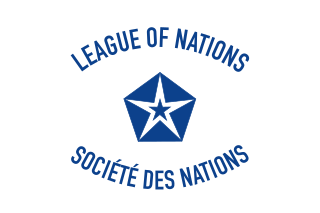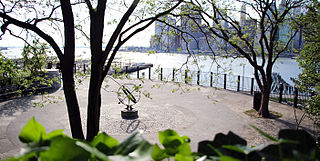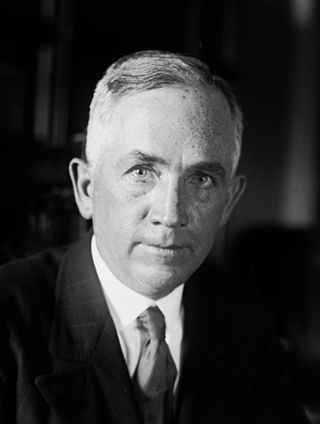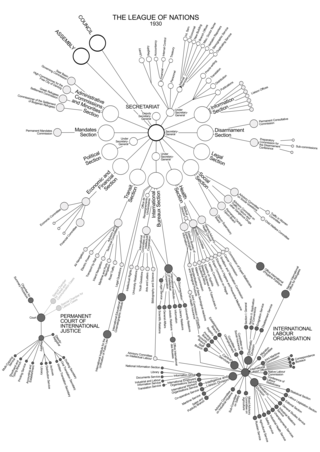Related Research Articles

The League of Nations was the first worldwide intergovernmental organisation whose principal mission was to maintain world peace. It was founded on 10 January 1920 by the Paris Peace Conference that ended the First World War. The main organisation ceased operations on 18 April 1946 when many of its components were relocated into the new United Nations. As the template for modern global governance, the League profoundly shaped the modern world.

United Nations Security Council Resolution 242 (S/RES/242) was adopted unanimously by the UN Security Council on November 22, 1967, in the aftermath of the Six-Day War. It was adopted under Chapter VI of the UN Charter. The resolution was sponsored by British ambassador Lord Caradon and was one of five drafts under consideration.

The Council on Foreign Relations (CFR) is an American think tank specializing in U.S. foreign policy and international relations. Founded in 1921, it is an independent and nonpartisan 501(c)(3) nonprofit organization. CFR is based in New York City, with an additional office in Washington, D.C. Its membership has included senior politicians, secretaries of state, CIA directors, bankers, lawyers, professors, corporate directors, CEOs, and prominent media figures.

David Rockefeller was an American economist and investment banker who served as chairman and chief executive of Chase Manhattan Corporation. He was the oldest living member of the third generation of the Rockefeller family, and family patriarch from 2004 until his death in 2017. Rockefeller was the fifth son and youngest child of John D. Rockefeller Jr. and Abby Aldrich Rockefeller, and a grandson of John D. Rockefeller and Laura Spelman Rockefeller.

The Paul H. Nitze School of Advanced International Studies (SAIS) is a graduate school of Johns Hopkins University based in Washington, D.C. with campuses in Bologna, Italy and Nanjing, China.

The Royal Institute of International Affairs, commonly known as Chatham House, is a British think tank based in London, England. Its stated mission is "to help governments and societies build a sustainably secure, prosperous, and just world". It is the originator of the Chatham House Rule.

Thomas Reeve Pickering is a retired United States ambassador. Among his many diplomatic appointments, he served as U.S. ambassador to the United Nations from 1989 to 1992.

Pascal Lamy is a French political consultant and businessman. He was the Director-General of the World Trade Organization (WTO) from 1 September 2005 to 1 September 2013 for 8 years. In April 2009, WTO members reappointed Lamy for a second 4-year term, beginning on 1 September 2009. He was then succeeded by Roberto Azevêdo. Pascal Lamy was also European Commissioner for Trade for 5 years, from 13 September 1999 to 22 November 2004 and is an advisor for the transatlantic think-tank European Horizons, as well as currently serving as the Honorary President of the Paris-based think tank, Notre Europe.
The Institute of Pacific Relations (IPR) was an international NGO established in 1925 to provide a forum for discussion of problems and relations between nations of the Pacific Rim. The International Secretariat, the center of most IPR activity over the years, consisted of professional staff members who recommended policy to the Pacific Council and administered the international program. The various national councils were responsible for national, regional and local programming. Most participants were members of the business and academic communities in their respective countries. Funding came largely from businesses and philanthropies, especially the Rockefeller Foundation. IPR international headquarters were in Honolulu until the early 1930s when they were moved to New York and the American Council emerged as the dominant national council.
The Advisory Committee on Postwar Foreign Policy was a secretive committee created on February 12, 1942, to prepare recommendations for President Franklin D. Roosevelt on post World War II foreign policy. Predecessors included the similar Advisory Committee on Problems of Foreign Relations and the Division of Special Research. It was created by Secretary of State Cordell Hull at the suggestion of his assistant Leo Pasvolsky and Norman Davis of the Council on Foreign Relations. The committee appointed subcommittees on political problems, economic reconstruction, territorial matters, legal questions and the creation of an international organization, all under the direction of Pasvolsky. After four sessions, the main committee disbanded, Hull preferring to rely on the smaller subcommittees.

The Social Science Research Council (SSRC) is a US-based, independent, international nonprofit organization dedicated to advancing research in the social sciences and related disciplines. Established in Manhattan in 1923, it maintains a headquarters in Brooklyn Heights with a staff of approximately 70, and small regional offices in other parts of the world.
Isaiah Bowman, AB, Ph. D., was an American geographer and President of the Johns Hopkins University, 1935–1948, controversial for his antisemitism and inaction in Jewish resettlement during WWII.

The School of International and Public Affairs (SIPA) is the international affairs and public policy school of Columbia University, a private Ivy League university located in Morningside Heights, Manhattan, New York City. SIPA offers Master of International Affairs (MIA) and Master of Public Administration (MPA) degrees in a range of fields, as well as the Executive MPA and PhD program in Sustainable Development.

Carl Johan Alexis Enckell was a Finnish politician, diplomat, officer and businessman.

Norman Hezekiah Davis was a U.S. diplomat. He joined the Treasury Department in 1917, serving as President Wilson's chief financial advisor at the Paris Peace Conference. In 1919 he was appointed Assistant Secretary of the Treasury, and the following year became Under Secretary of State.

Chad–United States relations are the international relations between Chad and the United States.
The Advisory Committee on Problems of Foreign Relations was a committee created by United States Secretary of State Cordell Hull on December 27, 1939, to examine "overseas war measures." It came about after Leo Pasvolsky, Hull's assistant, wrote a memorandum urging such a committee concerned with "problems of peace and reconstruction" that would review fundamental principles of a "desirable world order" and was originally called the Committee on Problems of Peace and Reconstruction. It was one of many such committees that Hull would create, reorganize, rename or abolish. Successors included the Division of Special Research and the Advisory Committee on Postwar Foreign Policy.

The League of Nations was established with three main constitutional organs: the Assembly; the Council; the Permanent Secretariat. The two essential wings of the League were the Permanent Court of International Justice and the International Labour Organization.
Richard T. McCormack is an American government official and diplomat. He has served nearly five decades advising policymakers on foreign affairs and global economic developments. He is currently a senior advisor for CSIS in Washington, D.C.

Leo Pasvolsky was a journalist, economist, state department official and special assistant to Secretary of State Cordell Hull. He was one of the United States government's main planners for the post World War II world and "probably the foremost author of the UN Charter." Thomas Connally said in his memoirs "Certainly he had more to do with writing the framework of the charter than anyone else." His New York Times obituary is subtitled "Wrote Charter of World Organization." A short, rotund, mustachioed pipe smoker with a very large and round head, he joked that he might find it easier to roll than to walk. An aide compared him to the third little pig in the Three Little Pigs, Hull called him "Friar Tuck". A hardworking "one-man think tank" for Hull, he preferred to stay invisible, in the background. In the words of Richard Holbrooke, he "was one of those figures peculiar to Washington – a tenacious bureaucrat who, fixed on a single goal, left behind a huge legacy while virtually disappearing from history."
References
- ↑ Laurence H. Shoup, William Minter (1977). Imperial Brain Trust: The Council on Foreign Relations and United States Foreign Policy. ISBN 0-595-32426-6.
- ↑ Imperial Brain Trust. p. 156.